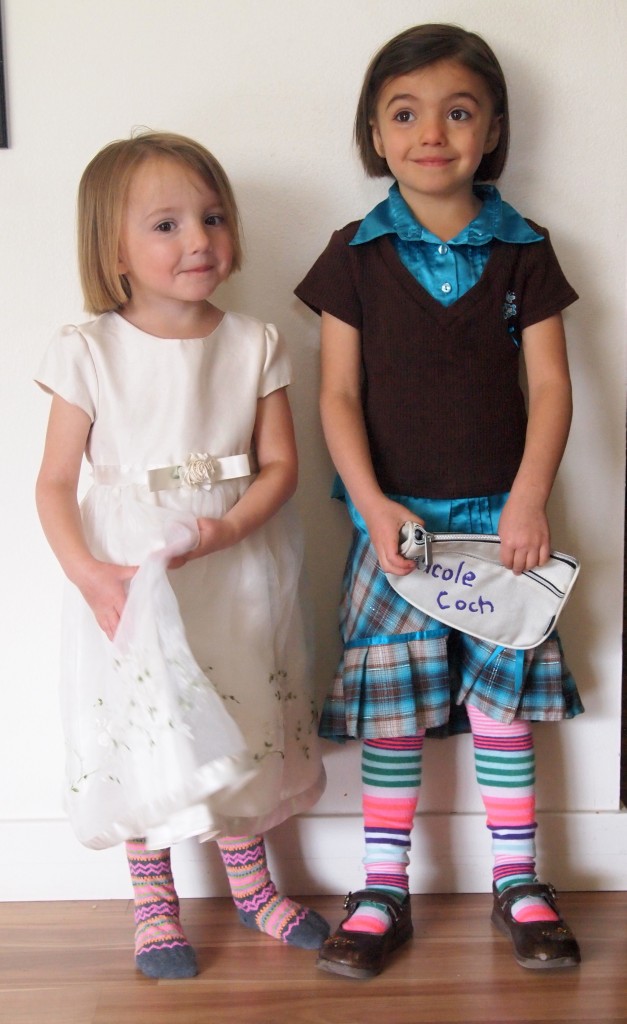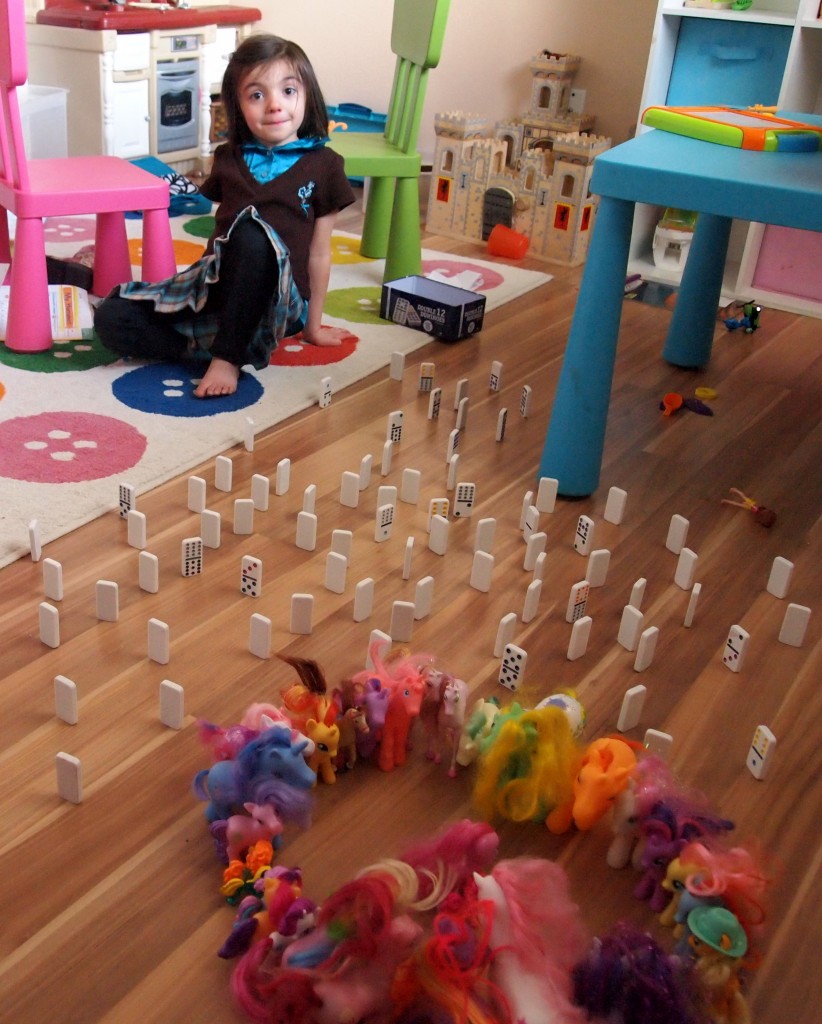Autism
If you read my previous post, you’ll know that part of Nicole’s diagnosis included Autism. It’s ironic that the kid who is in some ways my most social child, is the one who is diagnosed with Autism.
Autism is diagnosed in children who have difficulties in social interaction, have problems with verbal and nonverbal communication, and demonstrate repetitive behaviors. The amount to which each child with Autism demonstrates each of the three diagnostic criteria varies. Before I write about how I feel about my daughter having this label, I want to describe what Autism looks like in Nicole.
SOCIAL: For years I argued that Nicole couldn’t possibly have autism because she’s too social. She really likes people. One of our neighbors had a big gathering not long ago. As we walked home from their house, Nicole kept telling me how sad she was to leave because their house was so much more fun than our house. I tried to determine what aspect of their house made it so fun by talking to her and asking her questions. It wasn’t the food or the activity, it was the amount of people. She equated having lots of people in one’s house to fun. She was very excited when I told her that we would have lots of people in our house the following week. She doesn’t shy away from crowds and she likes to be the center of attention.
Most of my family lives far away which means there are sometimes long gaps between our visits. When they come to visit, Nicole is usually the first of my children to give them hugs and sit on their laps. I know that her warmth and affection for them is part of the reason that several of my family members have told me that she is their favorite.
Of all my children, Nicole is the most bold with strangers. I’ve often referred to her as our family ambassador because she readily hugs people she doesn’t know very well or holds their hands. I wonder if this socially unusual warmth for people she barely knows is related to her Autism. Last week at Isaac’s soccer game, there was a family next to us in a tent-like structure. We were eating Ritz crackers and Nicole spontaneously decided to share the crackers, only instead of walking over and offering them a cracker, she walked over and chucked a cracker into the tent-like structure at them. Another time as we were setting up to watch Charlotte play soccer, we noticed that Nicole was not with us. After searching the park and the bathroom, we finally found her a few fields over sharing snacks with a family we had never met. Nicole likes people and often has a desire to interact with them, but she seems to lack the judgement of socially acceptable behavior towards strangers. It’s like she hasn’t figured out that there’s a difference between how you act with someone you don’t know (or barely know) and how you act with someone you know well.
I don’t think Nicole comprehends the concept of being embarrassed. I’m not sure that I know how to describe this aspect of Nicole’s personality, but I’ll do my best. In any situation that I think of where one might feel embarrassed, I can imagine Nicole navigating the situation without any thought or concern for what other people might think or feel about her actions. She has had tantrums when other kids are at our house with no thought for what it might look like to her peers. One time she pulled down her pants and underwear on the playground at school. When I heard about the incident I knew immediately what had happened. She probably felt an urgent need to use the bathroom and her first instinct was to take her pants off because she didn’t want to get them messy. It probably never even occurred to her to be embarrassed about pulling her pants down. She often wears wacky combinations of clothes just because she likes them. I usually try to at least influence her clothing choices a little bit. Some of her choices I would have never put together, yet I find myself actually liking her sense of style.
Nicole does have some social behaviors that are clearly indicators of autism. She has difficulty with conversations. Most people respond to personal statements by either asking a question or making a relevant comment. Nicole regularly ignores such statements. For example, Dr. Smith was sitting near Nicole while Nicole was playing. Dr. Smith said “I have a dog.” A typical kid might say something like “what kind of dog?” or “I like dogs.” or “I don’t have any dogs, I have a cat.” Nicole completely ignored the statement. She didn’t even look up from playing. Dr. Smith made several other statements as she played and Nicole only ignored them or glanced at Dr. Smith briefly. Nicole can carry on a conversation, but only if the topic is of interest to Nicole.
Nicole can also be very rigid in her play. She designs a scenario and does not accept some changes to her scenario. She will accept small changes that fit within the unspoken rules of her scenario, but other changes are unacceptable. There is light at the end of this tunnel though, because I have seen that if you’re persistent, you can sometimes talk her into accepting the change you want to make. Nicole has a hard time playing with some same-aged children. I assume it’s because they disrupt her ideas of how things should be. Nicole’s favorite playmate is her older sister, Charlotte. Charlotte knows which types of ideas and scenarios appeal to Nicole and is able to pull Nicole in to play. Although they play well together, they do have conflicts. Their conflicts usually occur when Charlotte has an idea and Nicole does not want to cooperate with Charlotte’s idea. Charlotte sometimes tries to bully her ideas upon Nicole which does not work at all.
VERBAL AND NONVERBAL COMMUNICATION: In addition to the language results I wrote about previously, the testing also showed that Nicole regularly misinterprets nonverbal communicative information. On the test, she had difficulty properly matching emotion words to pictures of facial expressions. Sometimes in an attempt to get more natural facial expressions for pictures (not fake, forced smiles), I ask my girls to make mad faces or sad faces. Nicole always looks at her sisters to see their expressions before making her own.
REPETITIVE BEHAVIORS: Nicole’s repetitive behaviors include things like lining up toys, stacking cards, and making neat stacks of dominoes. She has a stack of pictures in a church bag that she loves to sort through. She can be entertained for an entire hour long sacrament meeting just flipping through her stack of pictures. I couldn’t talk her into playing a game of GO FISH with Ila and some girls in her kindergarten class, but on more than one occasion she has enjoyed looking through the stack of GO FISH cards and turning them over, two at a time and announcing “not a match” or “match” each time.
Autism seems to be the buzzword for disabilities in our generation. Where it once was a comparatively rare diagnosis, it’s now all over the place. It’s also a diagnosis that feels particularly weighty. Despite the Doctor telling us that the language problems present a greater concern than the level of Autism, I find myself thinking about that Autism label frequently. Of all the things the doctor told us about in our meeting, the label of Autism was the one she paused after to gauge our reactions and make sure we were all ok with it. We were all fine and had expected that specific diagnosis by the time she gave it to us.
Since Autism is a spectrum disorder, there is a lot of variability in severity. Nicole’s severity rating is so low (mild), I feel like I’m not really part of that club. (club meaning group of families who deal with Autism). It’s like there’s a group of people addicted to some really hard core drugs and I show up and say I’m addicted to caffeinated soda pop. I don’t really feel right yet saying “I have a daughter with Autism.” I feel like that statement is almost deceptive because I don’t have a daughter with severe Autism. I’m not embarrassed by the diagnosis or feel like it’s improperly applied, I just feel a strange sense of guilt using it, like I’m trying to make something more dramatic than it is. Now I feel a little like I’m rambling, but hopefully you get the point I’m trying to make.
Nicole has always been the child who I can’t imagine growing up. I can’t imagine her as a teenager or as an adult. I can’t imagine her getting married or having children, but I really hope she’s able to do all those things. I guess I can leave all those thoughts for another day. For now, I’ll just enjoy my spunky, crazy, silly, beautiful little girl who runs up to men she doesn’t know at soccer games and calls them “Captain Seat Belt Man” for no apparent reason.

